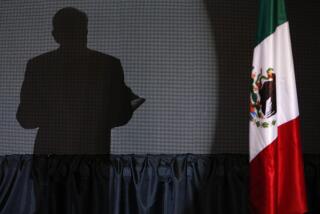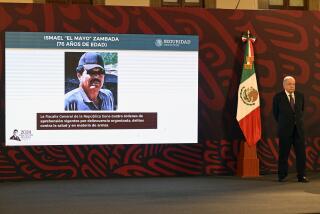Decision time on Cuban’s detention
MIAMI — He has admitted to bombing Havana hotels, served time for plotting to assassinate Fidel Castro and for more than 20 years was a fugitive from charges of blowing up a Cuban airliner.
But 17 months after Luis Posada Carriles was arrested and sent to a Texas immigration lockup, U.S. officials have declined to label him a terrorist or charge him with a crime. On Friday, a federal judge in El Paso gave the U.S. government until Feb. 1 to bring a case against Posada or the reputed bomber will be freed.
He has become a political liability for the Bush administration in its declared global war on terrorism.
As a veteran of nearly five decades of covert operations in Latin America, including the Bay of Pigs invasion, clandestine Cold War actions and the Iran-Contra affair, Posada knows where Washington’s bodies are buried.
If Posada, 79, were to be prosecuted, he probably would seek to defend himself against any criminal charges by arguing that his violent actions were on behalf of his CIA masters.
His Miami lawyer, Eduardo Soto, alluded to his client’s past collaboration with U.S. intelligence services as he pressed the Cuban militant’s unsuccessful quest for political asylum.
“A public trial of Luis Posada would certainly reveal embarrassing details on the degree to which U.S. covert operatives used terrorism as a tool in the 1960s,” said Peter Kornbluh of the independent National Security Archive at George Washington University.
Kornbluh has compiled declassified CIA and FBI evidence of Posada’s role in the 1976 plane bombing, near Barbados, of a Cuban airliner in which all 73 on board died. Among the documents in the archive’s online dossier is one recently obtained through Freedom of Information Act litigation that shows Posada informed his CIA minders of the plot to blow up the airliner three months ahead of the attack.
The administration has avoided bringing a criminal case against Posada, who enjoys strong support among Miami’s politically powerful Cuban exiles, by handling him like any other immigration offender and simply seeking his deportation.
Posada returned to Florida in March 2005, reportedly on a fellow exile’s shrimp boat sent to fetch him from an island off the Yucatan Peninsula. He’d made his way there six months after being pardoned by outgoing Panamanian President Mireya Moscoso in August 2004 after serving four years for attempting to kill Castro at a Panama summit in 2000.
Moscoso’s clemency decree for Posada and three U.S. militants was seen as a favor to the Bush administration in a presidential election year when the Cuban exile vote in Florida was vital.
Posada moved about Miami with impunity, despite indignant demands for his extradition by Cuba and Venezuela, where he is a naturalized citizen. Authorities arrested him two months after his arrival when he invited journalists to his Miami residence for a news conference.
A federal immigration judge in El Paso, where Posada has been held since May 2005, ruled last year that he should be deported to a country other than Venezuela or Cuba, which want to try him for the jetliner bombing. The federal government has spurned those countries’ extradition requests, contending Posada would be at risk of torture or execution.
The State Department approached at least six friendly foreign governments to take Posada, but Canada, Mexico, Guatemala, Panama, Costa Rica and El Salvador all refused. The Mexican government later said it would hand Posada over to Cuba if he reentered Mexico.
Soto argued in August that U.S. authorities couldn’t hold Posada indefinitely after abandoning efforts to send him abroad. U.S. Magistrate Norbert Garney agreed, and recommended in September that Posada be released.
In October, the Justice Department urged the court to keep Posada in jail.
“Luis Posada Carriles is an admitted mastermind of terrorist plots and attacks. The Department of Justice believes that Posada is a flight risk and that his release would be a danger to the community,” said spokeswoman Tasia Scolinos.
U.S. Immigration and Customs Enforcement then notified Posada that the government had decided to prolong his detention because of concerns that his release “would have serious foreign policy consequences,” according to an agency statement.
Under anti-terrorism powers claimed by the administration, Secretary of State Condoleezza Rice has only to ask Atty. Gen. Alberto R. Gonzalez to brand Posada a terrorist to keep him locked up while the government pursues criminal action, said David Sebastian, Soto’s paralegal on the case.
Much as the administration can indefinitely detain terrorism suspects at Guantanamo without legal recourse or formal charges, it can hold Posada on grounds that he poses a national security threat. The Justice Department missive makes clear that the administration considers him a terrorist but has yet to pursue that formal designation.
Soto has filed a writ of habeas corpus challenging the government’s continued jailing of Posada on the immigration violation. That move presents a dilemma for the administration: It could be forced to let a man they call a terrorist walk free or prosecute him and risk public airing of some of Washington’s darkest secrets.
U.S. District Judge Philip Martinez on Friday gave the administration the Feb. 1 deadline to prosecute or release Posada.
Neither the State Department nor the Justice Department would say what, if any, actions were being taken to ensure Posada remains in detention.
Posada’s fellow militants launched a petition drive demanding that the administration release him before today’s election or risk losing support for GOP candidates from among the anti-Castro constituency.
“Some of us vote for President Bush. Others, like me, vote against him because he doesn’t do anything for Cuba,” said Juan Torres Mena, a vice director of the Brigade 2506 Bay of Pigs veterans association.
“Those fighting against communism are in jail now,” he said. “Before we were freedom fighters. Now we’re terrorists.”
*
More to Read
Sign up for Essential California
The most important California stories and recommendations in your inbox every morning.
You may occasionally receive promotional content from the Los Angeles Times.











